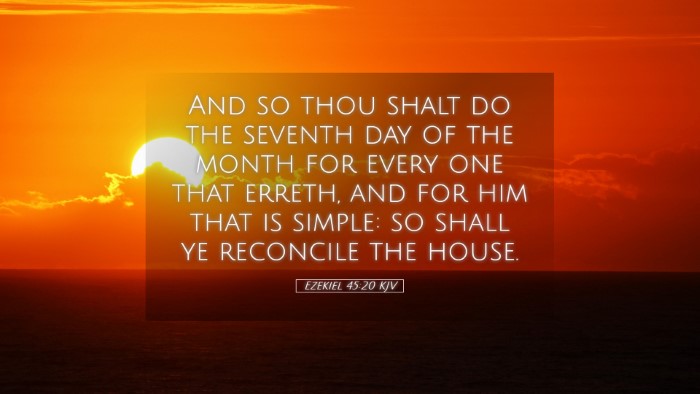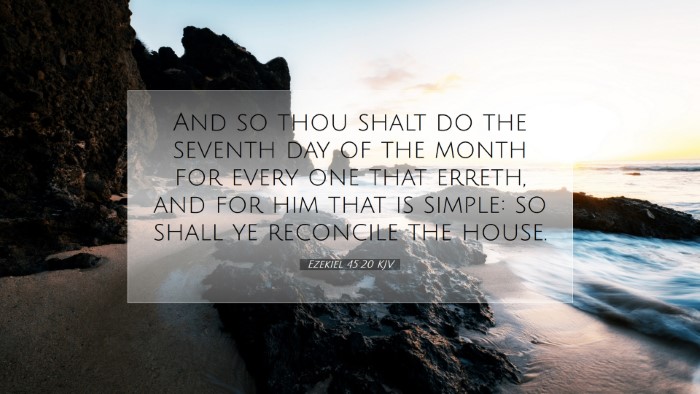Ezekiel 45:20 - Commentary Summary
Verse Context: Ezekiel 45:20 states, “And so you shall do on the eighth day of the month for every one who wanders for ignorance or for that which is too far off, as they are smitten for the unstated sins.” In this verse, we see provisions made for atonement and cleansing within the context of temple worship and society in ancient Israel.
General Theme
Ezekiel's prophetic vision is deeply rooted in the renewal of Israel's worship practices and the restoration of a proper relationship with God. Through this passage, he addresses the need for cleansing and atonement, highlighting God's desire for holiness among His people.
Commentary Insights
Matthew Henry’s Commentary
Matthew Henry emphasizes the importance of God’s requirement for ritual cleanliness in the worship of His people. He notes that the “eighth day” signifies both a sense of new beginnings and the conclusion of a process in God’s redemptive plan. For Henry, the verse illustrates God's mercy in providing a means for those who fall into sin out of ignorance or negligence. He asserts:
- God’s provision for sins: The Lord does not leave His people without recourse when they stray. The seventh day, being the Sabbath, culminates in a new beginning on the eighth day, a time for reflection and correction.
- Corporate Responsibility: The community is urged to collectively uphold holiness. Each sin, whether acted out of ignorance or intentional disregard, impacts the congregation.
Albert Barnes’ Notes
Albert Barnes points out that this specific instruction reflects the notion of an orderly and ceremonial approach to atonement, integrating both individual and communal aspects of sin. He offers key insights:
- Wandering and Ignorance: Barnes interprets “wanders for ignorance” as highlighting the unintentional nature of some sins, suggesting a compassionate God who understands human frailty.
- Significance of Cleansing: The emphasis on the eighth day correlates with themes found in the New Testament, where Christ represents the fulfillment of the Law and the ultimate cleansing, reinforcing the continuity of God’s plan.
Adam Clarke’s Commentary
Adam Clarke provides an in-depth historical and theological analysis of the verse. He draws attention to the proper observance of the Law and how it plays a crucial role in community life. Clarke elucidates several critical points:
- Symbolism of the Eighth Day: Clarke suggests that the eighth day represents a kind of spiritual resurrection, linking it to the ultimate sacrifice of Christ and the new covenant.
- Importance of Rituals: Clarke underlines the ceremonies required for atonement, indicating how these practices shape spiritual and communal identity. He encourages readers to see these rituals as reflective of deeper truths about sin and redemption.
Theological Implications
The theological implications of Ezekiel 45:20 reach far beyond the ancient Israelite context, extending into the New Testament understanding of forgiveness and grace. Both Henry and Barnes reflect on how the provision made for sin—even those committed unintentionally—aligns with the biblical principle that God desires all people to be restored to fellowship with Him.
Practical Application
For modern believers, this verse carries significant applications:
- Awareness of Sin: It encourages believers to remain vigilant about their spiritual lives, recognizing that ignorance does not absolve one from the consequences of sin.
- Community Accountability: Pastors and church leaders are called to foster an environment where communal sin is acknowledged, and pathways to atonement and healing are actively pursued.
- God’s Grace in Atonement: The verse serves as a reminder that God, in his justice, also provides means for restoration: an ever-relevant theme in Christian teaching today.
Conclusion
Ezekiel 45:20 offers profound insights into God’s redemptive plan and His expectations of holiness from His people. By examining the perspectives of noted commentators such as Henry, Barnes, and Clarke, we glean valuable lessons about atonement, the significance of community, and the eternal relevance of God's mercy and grace in the lives of believers.


